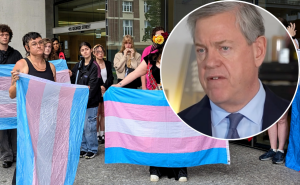
The Australian government has announced a national review into the treatment guidelines for trans and gender diverse young people.
In a statement issued on Friday afternoon, Health Minister Mark Butler said governments had a clear responsibility to ensure Australians are receiving the best medical care available.
“Two weeks ago, I sought advice from the National Health and Medical Research Council (NHMRC) and the Therapeutic Goods Administration on the current provision of care for trans and gender diverse Australian children and adolescents,” said Butler.
“After considering that advice, I have asked the NHMRC to undertake a comprehensive review of the Australian Standards of Care and Treatment Guidelines for Trans and Gender Diverse Children and Adolescents in Australia, and to develop new national guidelines.”
The National Health and Medical Research Council is Australia’s primary health and medical research agency, responsible or developing high quality guidelines for clinical practice.
The guidelines will be developed with an expert committee, and will be informed by public consultation, international work, and lived experience.
“It is important that this process is driven by evidence and is conducted by our most eminent medical researchers and clinicians, engaging with Australians with lived experience,” said Butler.
Interim advice on the use of puberty blockers will be issued in the middle of 2026.
Review “cautiously welcomed” by advocacy groups
The news comes days after the Queensland government announced an immediate pause on puberty blockers to all new gender dysphoric patients under the age of 18 in the public system, as well as an external review into puberty blockers and hormone therapy.
Speaking to reporters in Adelaide on Friday afternoon, Butler said the Queensland government should leave the review to the Federal government.
“I’ve indicated to minister Nicholls that I don’t think it would be appropriate for Queensland to continue with their stated intention to undertake an evidence review in this area of care. These issues should be nationally consistent, and in my view should be driven by the preeminent authority, which is the NHMRC.”
It is certainly best practice to ensure that state governments and private services are operating in accordance with national and consistent clinical guidelines that are issued, or at least approved, by the nation’s preeminent authority in this area.”
A statement from advocacy group Equality Australia said the national review was being “cautiously welcomed”.
“Equality Australia will keep working hard with other LGBTQ+ organisations to ensure our community contributes to the process – and that gender affirming care continues to be delivered to the young people who need it across Australia.”
“To our trans and gender diverse community, we will always stand with you and fight for your right to exist with dignity, safety and respect.”
Transcend Australia issued similar sentiments, with CEO Jeremy Wiggins saying that “if this process remains ethical, draws on evidence, and the right people, including those with lived experience, we are confident the outcome will be positive for trans children and young people.”
The Australian Christian Lobby issued a statement calling for the government to ensure the review was “truly independent, free from activist influence, and grounded in medical evidence—not ideology.”



